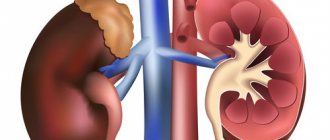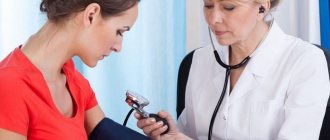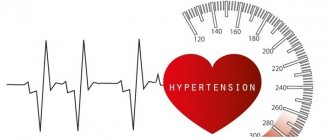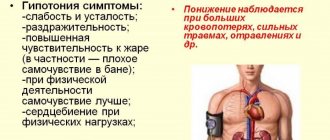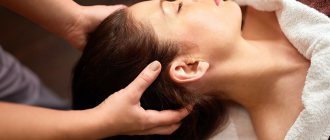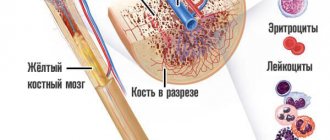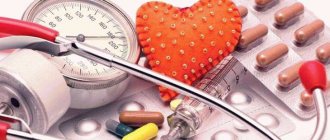With hypertension, most physiological processes are disrupted, so during night sleep the pressure level can increase significantly. This reaction is a poor diagnostic criterion, since it signals a disorder in the parasympathetic nervous system, increasing the risk of developing cardiac pathologies, including myocardial infarction. Isolated increases in blood pressure at night present great challenges, as they are difficult to diagnose and treat. When identifying problems with nighttime blood pressure, patients should find out why blood pressure rises at night and what diseases lead to this disorder.
Causes of nocturnal hypertension
Only the person himself can accurately answer the question of why pressure begins to rise at night, since he knows what could have provoked an increase in vascular tone throughout the day, and therefore a possible jump.
Normally, the vagus nerve, a representative of the parasympathetic nervous system, is responsible for vascular tone at night. It ensures the stability of the physiological blood pressure cycle. A variety of reasons can lead to abnormal vasospasm.
Age
Increased blood pressure is not a natural result of aging. But age-related changes in the vascular wall (loss of elasticity, impaired renal function, calcification, sclerosis, atherosclerotic plaques, decreased ability of receptors to respond to changes, insufficient nutrition, oxygen supply to tissues) contribute to the development of hypertension, including nocturnal hypertension.
Particularly characteristic of age-related hypertension is a sharp increase in the systolic (cardiac) indicator at night, which is explained by persistent vasospasm as a result of wear and tear of the vasodilator mechanisms of arterial balance when the renin-aldosterone system is activated.
Therefore, older people have evening quarrels with loved ones, playing sports before bed, smoking, watching movies with loud music, reading past midnight, electronic gadgets, salty or sweet foods at night, alcohol, drinking a lot of water, changing climate or time zone (vacation). , business trips), night shift work - always provoke nocturnal hypertension with unpredictable consequences. After 45, a healthy lifestyle and giving up bad habits literally prolong life.
Apnea
An increase in pressure at night can be the result of a short-term cessation of breathing - apnea. The oxygen content in the blood drops: from 95% to 65% in just one minute. Hypoxia is perceived by the body as a stressful situation. All compensatory mechanisms are activated: the adrenal glands release hormones into the blood, cardiac output increases, arteries spasm, and the process of night rehabilitation is blocked.
In the morning, patients are irritable, they want to sleep, and they feel arrhythmia. In this case, the maximum high pressure occurs precisely at night and in the morning, but high blood pressure numbers are recorded throughout the day. The peculiarity is that the diastolic indicator increases predominantly, and conventional antihypertensive therapy has almost no effect. The situation may turn out to be critical, leading to cardiac arrest or death.
Nephropathy
Blood pressure increases at night with nephropathy. This is explained by the release of a large amount of renin into the blood, which triggers a complex chain of biochemical processes leading to hypertension.
Biologically active substances in the bloodstream cause generalized vasospasm and retain water and sodium. This is most often observed in diabetic nephropathy, which can be detected in the early stages if 24-hour blood pressure is regularly monitored. Thus, it is possible to avoid chronic renal failure (manifestations of hypertension are diagnosed before protein appears in the urine).
Panic attacks
Vegetative-vascular dystonia, with a predominance of the sympathetic nervous system, is accompanied by night crises or panic attacks. The mechanism is simple: an intense release of adrenal hormones into the bloodstream. Clinically, there is a sharp awakening, lack of air, profuse sweat, tachycardia, a feeling of anxiety and fear. The condition lasts from 10 to 30 minutes. After finishing, I want to urinate. The next 24 hours leave patients with a feeling of weakness and decreased performance.
- ABPM: what is it and why is daily blood pressure monitoring needed?
How are hypertension and insomnia related?
Directly. Violation of the rest regime (impossibility of night recovery) occurs when:
- nervous system dysfunction;
- hormonal imbalance;
- incorrect functioning of the hypothalamus;
- overvoltage;
- feeling unwell;
- arrhythmias;
- stress.
In this case, a vicious circle arises: high blood pressure provokes insomnia, and it provokes tachycardia, which again causes hypertension. Lack of sleep leads to a decrease in immunity, the patient begins to suffer from nightmares, migraines, and irritability.
Most often, patients are concerned about the question: why does blood pressure rise only at night, but behave normally during the day? However, taking antihypertensive drugs does not change the situation. This is an important point, for several reasons:
- incorrectly selected dose of medication;
- insufficient frequency of administration;
- incorrect combination of drugs;
- stress during the day;
- mental overstrain due to physical inactivity;
- smoking, drinking large amounts of coffee, alcoholic beverages;
- poor nutrition;
- jet lag due to working at night;
- watching movies, gadgets at night.
It is necessary to consult a doctor and change your medication regimen, which will prevent the risk of developing a heart attack or stroke.
Nutrition
It is very important for hypertensive patients to follow some dietary rules. There is a special diet for them - table No. 10. You need to eat no later than 2-3 hours before bedtime. Food should be light and low in calories. A full stomach and intestines are enlarged before going to bed, and because of this they put pressure on the diaphragm. And this increases blood pressure.
Higher calorie foods should be consumed in the morning and at lunchtime. This way they will have time to digest throughout the day. Also, hypertensive patients are not recommended to drink tea before bed. Why should you give it up in the evening? A large amount of fluid activates increased kidney function and an increase in fluid volume in the body. Accordingly, because of this, the pressure rises at night.
Nutrition for hypertension involves reducing the amount of salt consumed. Excess of it provokes quite unpleasant symptoms - increased blood pressure at night, swelling, impaired kidney function and fluid retention in the body.
The importance of diagnostics
Examination for hypertension will help save health, and sometimes life. At home, full monitoring of increased blood pressure levels at night is impossible. However, patients at risk need to measure their blood pressure at home three times a day - when they wake up in the morning, during the day and before going to bed. These figures allow us to determine at what time of day the indicators are highest.
To prescribe adequate treatment, it is necessary to undergo diagnostics in a hospital using the ABPM method - 24-hour blood pressure monitoring. Such an examination most accurately determines nocturnal hypertension, which will allow you to adjust your medication regimen.
Why do we get sick
Many common diseases today - obesity, diabetes, hypertension, etc. - are a direct consequence of the modern lifestyle. We live in a fairly safe world. You no longer need to constantly run away from predators, earn food with sweat and blood, starve for weeks because frost hit or you couldn’t shoot anything.
All these realities of primitive life are in the past. Now we go to work and to the supermarket by car, we constantly have access to a large amount of high-calorie food, after eating, we lie on the bed for hours and hardly move. This mode of life is comfortable, but our genes are “tuned” to something else—active activity.
An excess of consumed calories and a lack of physical activity lead to metabolic disorders. The consequence is diseases such as diabetes and hypertension.
Hypertension at night
In a healthy person, blood pressure drops during sleep and rises again in the morning. With nocturnal hypertension, there is an increase in blood pressure. This pathology is dangerous because a person does not immediately notice it, and morning sickness after such a jump is attributed to severe fatigue or other reasons.
Causes of the phenomenon
Blood pressure rises at night during sleep due to the following factors:
- Poor nutrition. Consumption of salty and fatty foods, tea, coffee, alcohol before bedtime leads to disruption of the kidneys, the appearance of edema, as a result of which the load on the heart and blood vessels increases.
- Violation of the daily routine. The human biological clock is set to the fact that night is a time of rest and relaxation. Staying awake during this period causes stress to the body, disrupts many processes in it and can raise blood pressure.
- Hormonal disorders. The endocrine function is responsible for metabolism in the body; failures in its functioning are one of the causes of hypertension.
- Diseases of the cardiovascular system. In this case, the pressure can rise both during the day and at night.
- Bad habits. Smoking and drinking alcohol cause vasospasm, leading to hypertension.
Main symptoms and risk group
In the initial stage, a person wakes up at night due to a headache (often in the back of the head) and discomfort in the chest. In the morning he does not feel rested. This condition persists for several days. As the pathology progresses, the following symptoms are added to the existing symptoms:
- Knee pain at night when at rest: pain in the knee joint
- dyspnea;
- pain in the heart area;
- blurred vision;
- heart problems (angina);
- changes in the vascular pattern of the fundus.
At the third stage, changes occur in vital organs that are considered irreversible. In this case, the increase in pressure during night sleep is characterized by indicators of 180/110 and above. A hypertensive patient with stage 3 has a history of angina pectoris, he constantly feels short of breath and cannot perform simple physical actions, for example, running or climbing a mountain.
It is important to know! At risk are people who like to eat at night, as well as night shift workers and patients with disorders of the heart and nervous system, including vegetative-vascular dystonia and low blood pressure (hypotonics). A hereditary factor can also lead to the disease.
Risks to health and life
Nocturnal hypertensive crisis is a very dangerous condition. In some cases, it leads to the following consequences;
- myocardial infarction;
- stroke;
- death in a dream.
The first degree of pathology in the absence of adequate therapy leads to further disorders, the blood pressure level will only increase, not decrease. The disease affects the quality of life, since the body does not receive proper rest, and this, in the initial stage, is accompanied by a feeling of weakness and fatigue.
Persistent hypertension leads to irreversible dysfunction of the heart, kidneys, and brain, which is accompanied by angina pectoris, decreased hearing and vision, and changes in the elasticity of the vascular walls.
Advice! If you experience any symptoms of increased blood pressure within a few days, you should consult a doctor - a cardiologist or neurologist. If you feel suffocation or headache, call an ambulance immediately!
Signs of nocturnal hypertension
Increased blood pressure at night may be asymptomatic. Therefore, you can suspect the presence of a disorder by measuring your blood pressure after sleep in the morning. If an excess of normal values for the patient is recorded, then the episode of high blood pressure occurred during night sleep.
One of the clinical signs of the disorder is a violation of the general condition, which manifests itself as malaise immediately after waking up. Typically, patients exhibit the following symptoms indicating nocturnal hypertension:
- drowsiness, feeling of exhaustion, loss of strength;
- concentration disorder, decreased labor productivity;
- attacks of headache, dizziness, nausea;
- muscle weakness;
- constant noise in the ears, impaired visual function, swelling.
The long course of latent hypertension, which manifests itself exclusively at night, leads to the development of complications associated with damage to the main organs and systems of the body. Thus, the formation of angina pectoris, arrhythmia, encephalopathy, and transient cerebral ischemia is observed if the pressure constantly increases at night. In severe cases, a heart attack, acute cerebrovascular accident, heart and kidney failure, and loss of vision may develop.
Important! During sleep - an attack of nocturnal hypertension, which feels similar to a nightmare. A person awakens abruptly, and he experiences a feeling of panic, shortness of breath, lack of air and the inability to orient himself in space.
Why in the lying position?
There are diseases that few people have heard of. Therefore, people often do not even suspect that they have serious health problems. This is the main argument why blood pressure rises at night when lying down.
One of these diseases is OSA (obstructive sleep apnea syndrome). This is the cessation of pulmonary ventilation for 10 seconds or more. An attack can last 20-30 seconds, and in particularly advanced cases, reach 2-3 minutes and in total reach 60% of sleep time.
Obstructive sleep syndrome at night becomes a regular process when it is preceded by pulmonary apnea during the day with 10-15 repetitions within an hour. The syndrome is accompanied by daytime sleepiness and impaired intellect and memory processes.
- Treatment of hypertension with folk remedies at home
Obstructive sleep apnea requires snoring, which accompanies frequent or complete cessation of the respiratory function of the lungs. As a result of gross fragmentation of sleep, the level of carbon dioxide in the blood increases, which explains daytime sleepiness.
The second form of manifestation of obstructive apnea can be called hypopnea. In its phase, complete cessation of breathing does not occur, but it lasts longer and is just as dangerous.
The disease is serious and can interrupt sleep by activating the hypothalamic-pituitary system. There is a change in the activity of the parasympathetic nervous system to the sympathetic one, and it becomes difficult to sleep.
This leads to depressive states, then to heart attacks and strokes, which are preceded by high blood pressure due to hypertension.
Why, if the pressure rises at night precisely in a supine position, is it necessary to urgently consult a doctor? A person with this diagnosis may fall asleep and not wake up.
In this regard, dangerous conditions of apnea and hypopnea require immediate medical attention.
Human life mode
A sedentary lifestyle directly affects the functioning of the cardiovascular system, one of them is nocturnal hypertension. Causes related to lifestyle today most often provoke pathology. People with sedentary jobs are especially susceptible to this. If a person moves little, the result will appear quite quickly. With physical inactivity, blood begins to circulate more slowly. Such deterioration is fraught with increased peripheral vascular resistance. As a result, blood pressure rises in the evening. In people who lead a sedentary lifestyle, nocturnal hypertension is a common condition.
Why does blood pressure rise at night? This is explained by the fact that the body produces hormones that regulate the functioning of the cardiovascular and endocrine systems only during a full night's sleep. If night sleep is too short or absent at all, then these substances are produced in small quantities. This effect on the body is fraught with arterial hypertension, increased blood sugar levels, and endrogenic stress.
Treatment methods for nocturnal hypertension
How to treat nocturnal hypertension depends on the stage of the disease. At the initial stage, lifestyle changes, diuretics (Clopamide, Furosemide) and sedatives of plant origin are sufficient. The main goal is to reduce the load on the blood vessels. Patients should completely review their diet and limit salt intake, especially after lunch. Avoid consuming caffeinated drinks and strong tea.
As a diuretic, you can use a decoction of rose hips, tansy, and mint. Taking sedatives can reduce brain activity and relax the central nervous system, thereby normalizing blood pressure. Alcohol tinctures of peony, valerian, and motherwort improve the natural process of falling asleep.
Drug therapy for stages 2-3 of nocturnal hypertension
Treatment of nocturnal hypertension in the second and third stages is carried out with medications. Shown:
- calcium antagonists (Corinfar, Felodipine) - help improve the condition of the tissues of the vascular walls;
- direct renin inhibitor (Methiopril, Capoten) - reduces the secretion of renin by the kidneys, helps reduce the rate, reduce the volume of circulating plasma;
- beta blocker (Matoprolol, Viske) - affects the receptors, the vessels deflate, weaken, and cease to provide resistance to the periphery.
Medicines that lower blood pressure should be taken schematically.
In each individual case, the duration of use and dosage are determined by the doctor. Independent uncontrolled use of such drugs can cause a crisis. Calcium antagonists should be taken with caution. The medicine has many side effects and can cause swelling of the face, arms, legs, and dizziness.
In addition, B vitamins are prescribed to restore central nervous system cells, and magnesium to normalize heart rate.
Diet
Table No. 10 is recommended for hypertensive patients. The diet allows for consumption:
- any types of vegetable crops, raw, boiled, steamed, stewed;
- fruit salads, fresh juices, smoothies;
- meat, fish and dairy products with reduced fat content;
- whole grain bread made from rye flour, crispbread;
- legumes, mushrooms, cereals;
- It is better to replace sweets with jam, honey, pure sugar (allowed to be consumed in small quantities).
Nocturnal hypertension of 2-3 degrees uses a salt-free diet as an additional measure in treatment. Everything that comes to the table of a hypertensive patient must be carefully checked. Severe swelling can be relieved by reducing your daily water intake.
After suffering a hypertensive crisis, it is better to refuse food for a day. You can eat fruits or vegetables; meat and fish broths are strictly prohibited. Dishes are prepared without salt. Together with the first courses, the daily water consumption rate is 1 liter.
What should your blood pressure be like at night? 4 profiles
One of the readers in the article Arterial hypertension: summary of European recommendations 2021 found the phrase:
Night-time BP (blood pressure) levels are a better predictor of cardiovascular events than daytime BP.
The reader had a question about what blood pressure should be at night compared to during the daytime. In this article I will tell you how blood pressure should change at night and what problems may lie here.
Circadian blood pressure cycles
Changes in blood pressure levels during the day have general patterns
both in healthy individuals and in patients with arterial hypertension.
- The morning peak in blood pressure occurs between 6 a.m. and 12 a.m. (which is why most antihypertensive drugs must be taken early in the morning to have time to work).
- This is followed by a slight decrease and stabilization of blood pressure levels.
- The evening peak in blood pressure is lower than the morning peak and occurs around 19:00.
- Then blood pressure decreases. Minimum numbers are observed from midnight to 4 am.
- After 4 am, blood pressure gradually increases and then increases sharply 1 hour before waking up.
Normally, from 4 to 10 o'clock the morning rise rate is
systolic blood pressure should be less than 10 mm Hg. Art. per hour, diastolic - less than 6 mm/hour. The total rise should not exceed 56 and 36 mmHg. Art. respectively.
Morning is the only period during the day when increased clotting
blood. Patients with cardiovascular diseases are more likely to experience cardiovascular accidents (heart attacks and strokes).
At night, average blood pressure should decrease by an average of 10-20% compared to daytime pressure. The person is lying down or sleeping, he is relaxed, so high blood pressure is not required. But if the patient works the night shift or does not sleep, blood pressure at this time almost does not decrease and may even increase compared to daytime.
24-hour blood pressure monitoring (ABPM)
For comparison, average daytime and average nighttime values obtained during ABPM
(24-hour blood pressure monitoring). For ABPM, the patient wears an automatic blood pressure monitor for a day or longer, which turns on regularly, usually every 15-30 minutes during the day and every 30-60 minutes at night, pumps air into the cuff, measures blood pressure and stores the readings in the internal memory for subsequent analysis.
Standards for average blood pressure values
according to ABPM data recommended by the Russian Medical Society for Arterial Hypertension and the All-Russian Scientific Society of Cardiologists:
- during the day: from 100/60 to 140/90 mm Hg. Art.,
- at night: from 86/47 to 125/80 mm Hg. Art.
24-hour blood pressure monitoring is a simple but very useful test. ABPM allows you to calculate several indices (coefficients) and clarify the risk of complications or the likelihood of developing hypertension in doubtful cases.
There is a story on the Internet about daily blood pressure monitoring. Now I went to the cardio center. We hung up a device for daily blood pressure measurement. A cuff on the arm and a motor in the purse. Periodically measures blood pressure. On the way back, we found out some two guys - like who is he, where is he from, is there any little things? So we were standing around, talking, the situation was heating up, and then this little motor started humming—the cuff was pumping. Out of surprise, I straightened up and froze (I forgot something about him). These two guys also stared at me in amazement - suddenly it started buzzing, and my left arm was pumping up before my eyes! Then the engine stalled, and I, in a robotic voice, with a glazed look into nowhere, said: “Combat mode is on.” How they ran away... You had to see it!
4 groups (profiles)
Although blood pressure should drop by 10-20% at night, in reality different situations are possible.
According to the degree of reduction in nocturnal blood pressure in the English and Russian scientific literature, 4 groups (profiles)
of people:
- dippers
, or dippers (English dip - to go down, dive, dive) - at night blood pressure is 10-20% less than during the day. This is the norm. This reduction should occur in healthy people; - overdippers
, or overdippers (English over - too, too much) - at night blood pressure decreases by more than 20%. If blood pressure is initially low, an excessive decrease may be dangerous; - non-dippers
, or non-dippers (the particle non means negation) - nighttime blood pressure does not decrease enough, by no more than 10%; - night-peakers
, or night-peakers (English peak - peak, top) - night blood pressure rises above daytime blood pressure. This is a rare, but most unfavorable situation in hypertensive patients.
When assessing the results of nighttime blood pressure monitoring, you must definitely pay attention to periods of time without sleep, restless sleep, and getting up. For example, turning from one side to the other leads to an increase in blood pressure by 20 mmHg. Art. The patient should reflect these points in a diary, which is kept in parallel with ABPM.
Now let's learn more about each group and what it means.
Dippers
A decrease in blood pressure at night by 10-20% (dippers) is a normal and desirable situation. Some authors include here a reduction in blood pressure even up to 22%. In patients with the dippers profile, the blood pressure graph at night looks like a bucket-shaped depression.
Overdippers
If nighttime blood pressure is on average lower than daytime blood pressure by more than 20-22%, such subjects fall into the overdippers group. With a sharp and excessive decrease in blood pressure at night, the likelihood of fainting (and injury) when getting up to go to the toilet increases, as well as the risk of ischemic complications (lack of blood supply) to the brain and heart. Episodes of hypotension
periods of time with blood pressure below 90/60 mm Hg are considered. Art. during the day and below 80/50 mm at night. If the patient is being treated for hypertension, the treatment should be adjusted.
Non-dippers
A decrease in blood pressure at night of less than 10% (non-dippers) gives a “monotonous” daily graph of blood pressure levels over time. There is no significant decrease at night. This is an unfavorable situation that often occurs with secondary hypertension
(due to some other disease), for example:
1) with renovascular
hypertension. Blood pressure is persistently and persistently elevated and is difficult to treat. This occurs when the renal arteries are narrowed (stenosis) by 50-70% or more, when the kidneys are poorly supplied with blood and increase the production of renin to increase blood pressure and improve their blood flow. There are 2 main causes of narrowing of the renal arteries:
- 80% (more often in men) have atherosclerotic stenosis
(due to the abundance of atherosclerotic plaques). It has been established that if a patient has atherosclerosis of the arteries of the heart or lower extremities, then with a 40-45% probability he will also have damage to the renal arteries; - 20% (more often in women) have fibromuscular dysplasia
. This is an abnormal thickening of the artery walls that is not associated with atherosclerosis or inflammation. The reason is unknown. The narrowing can be single or multiple and alternate with areas of dilation of the artery (aneurysm). Fibromuscular dysplasia can also affect the arteries of the brain, stomach and intestines, and lower extremities.
Rare causes of renal artery stenosis include:
- embolism (blockage by a detached blood clot),
- injuries,
- dressing during operations,
- compression of the renal artery by a tumor.
2) primary hyperaldosteronism
(Conn's syndrome) also gives a “monotonous” blood pressure graph without a clear decrease at night. Conn's syndrome is caused by a benign tumor of the adrenal gland that secretes aldosterone uncontrollably. Excess aldosterone leads to sodium and water retention in the body (edema) and loss of potassium in the urine (blood potassium levels below 3.5 mmol/L are accompanied by muscle weakness and ECG changes).
3) pheochromocytoma
- a benign tumor of the adrenal glands that uncontrollably releases the hormones adrenaline and norepinephrine into the blood. There is a paroxysmal form (BP increases in the form of characteristic attacks with a feeling of fear, anxiety, trembling, sweating, palpitations, headache, nausea) and a permanent form (BP is constantly increased).
4) with malignant
arterial hypertension.
This is a very high, persistently elevated blood pressure (above 180/120 mm Hg) with damage (necrosis) to the walls of blood vessels, which can lead to strokes, papilledema (vision loss), ischemia and dysfunction of various organs. The vast majority of cases of malignant hypertension are caused by damage to the kidneys, renal arteries or hormonally active tumors (pheochromocytoma, primary hyperaldosteronism);
5) for diabetes
(due to hyperglycemia, the innervation of the heart and blood vessels is disrupted);
6) after transplantation
(heart transplants);
7) with chronic renal failure (chronic renal failure);
for sleep apnea syndrome (more about it below).
Night speakers
If blood pressure is higher at night than during the day
oh, this is the rarest, but at the same time the most unfavorable situation. Normally, neither children nor adults have a night-peakers profile.
The reasons are the same as for the non-dippers profile, but I will separately mention sleep apnea syndrome
. During sleep, due to relaxation of the body muscles, the walls of the pharynx collapse and block the path of air. Apnea occurs (a period of no breathing when air cannot enter the lungs). Apnea lasts on average 20-30 seconds. Then, due to a lack of oxygen in the blood, the respiratory center is activated, a partial awakening occurs with an increase in the tone of the muscles of the pharynx and the restoration of its patency. This sounds like a snore followed by a series of rapid, deep breaths, usually accompanied by heavy snoring. The patient then falls back into deep sleep and the cycle repeats. During the night there are up to several hundred cycles of stopping and resuming breathing. Deep phases of sleep completely or partially disappear. The patient does not sleep well, but is not aware of his micro-awakenings and does not remember them the next day.
One of the subjective signs of sleep apnea syndrome is a feeling of shallow, unrefreshing sleep.
. Patients get up in the morning sleep-deprived and often feel very sleepy during the day.
Sleep apnea syndrome occurs:
- in 90-95% of people with severe obesity (body mass index greater than 35);
- those who snore during their sleep (not all snorers have sleep apnea syndrome, but this syndrome practically does not exist without snoring);
- during pregnancy,
- in women during menopause.
There will be a separate article about sleep apnea syndrome.
The dangers of insufficient blood pressure reduction at night
High blood pressure has a devastating effect on arteries and target organs
(brain, heart, kidneys, eyes). If blood pressure is elevated at night, the pathological process accelerates. As a result, they develop:
- hypertrophy of the left ventricular myocardium (in the future this contributes to arrhythmias and the development of chronic heart failure),
- IHD (coronary heart disease) and increased mortality from myocardial infarction,
- strokes,
- kidney damage with the appearance of albumin in the urine (microalbuminuria) and the development of renal failure,
- retinopathy (damage to the retina of the eye).
Features of the development of hypertension in patients with apnea syndrome
The nighttime increase in blood pressure in patients with apnea is caused by the fact that during sleep the human body does not rest, but is under stress. Cyclic stops of breathing and lack of oxygen during apnea trigger increased production of adrenaline and norepinephrine. Because of this, the heart begins to work faster and more powerfully, vascular tone increases, which causes an increase in blood pressure. If breathing stops did not occur during sleep, then the picture of pressure changes would be different - we would observe a physiological decrease in its nighttime level relative to what it was during the daytime.
The peculiarity of the diagnosis of hypertension is that it is established during the day. Experts rarely pay attention to how the patient’s blood pressure “behaves” at night or immediately after waking up. Meanwhile, 24-hour blood pressure monitoring gives a more complete picture of the disease and allows one to suspect the presence of sleep apnea.
If you notice an increase in blood pressure, contact us, and our cardiologists will definitely help you. Sign up by phone.
Arterial hypertension and sleep apnea
At present, the connection between these two conditions is not in doubt. It has been established that about half of patients with apnea syndrome have high blood pressure (BP), and among all patients with identified hypertension, 30% have snoring and pauses in breathing during sleep.
In this regard, back in 2004, the US Joint National Committee on the Prevention, Diagnosis, Evaluation and Treatment of High Blood Pressure published in its report data according to which secondary (that is, resulting from a disease) arterial hypertension most often occurs precisely under the influence of apnea syndrome. Let us recall that it was previously believed that the leading cause of secondary hypertension was kidney disease.

